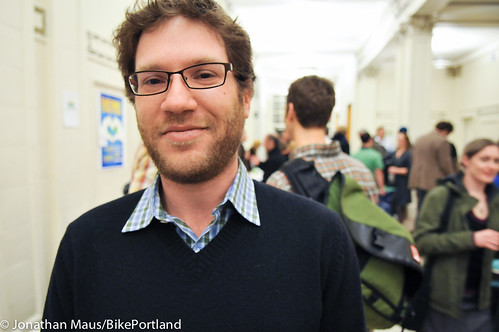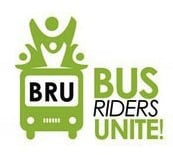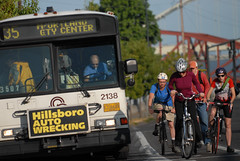
(Photos © J. Maus/BikePortland)
“The first question one needs to ask themselves is why they care about bicycling. If it’s about personal responsibility for a healthier, safer community and earth, then public transit investments are paramount.”
With major trouble in TriMet-land, we need all the activism around the massive agency we can get. Over the past year or so I’ve been hearing more and more about a scrappy local non-profit that’s been doing a heck of a job educating people and fighting for transit access. They’re called OPAL. It stands for Organizing People, Activating Leaders.
At the recent Active Transportation mayoral debate, I met OPAL’s Executive Director Jonathan Ostar. Given the gloomy budget proposal TriMet released earlier this week, and the realization that the survival of our regional transit system is at stake, I thought we should all learn a bit more about OPAL and what they’re about. I asked Ostar a few questions via email. His answers are below…

“We’re a grassroots community-based nonprofit working to empower low-income communities and people of color around environmental justice issues. Environmental justice is the right to a decent, safe and healthy quality of life where people live, work, play and pray. Low-income communities and communities of color most often bear the disproportionate impact of our decision-making while receiving a disproportionate share of the benefits.
OPAL stands for Organizing People, Activating Leaders, and we build power to address the root causes of discrimination and oppression. OPAL was formed in 2005 to continue the critical grassroots organizing work started in the late 1990’s in N/NE Portland, and to extend that work to East Portland as the demographics of the region were changing. From 2007 through 2009, OPAL focused on education and outreach around air quality and asthma concerns, primarily along the I-205 freeway. OPAL also co-founded the Transportation Healthy Equity Network with Coalition for a Livable Future, which includes groups such as Upstream Public Health, Willamette Pedestrian Coalition, Bicycle Transportation Alliance, Community Cycling Center, Oregon Public Health Institute, Transportation for America, RideConnection, the Urban League, AORTA, and others. Aside from transportation equity issues, OPAL also works on issues related to sustainable communities, such as housing justice, air toxics and environmental health.”
“The first question one needs to ask themselves is why they care about bicycling. If it’s about personal responsibility for a healthier, safer community and earth, then public transit investments are paramount. You simply cannot get to the place of having clean air, reducing greenhouse gas emissions and stemming climate change, and ensuring walkable, safe communities without a safe, affordable and accessible public transit system.
Is bicycling part of this solution? Absolutely. But we cannot get there with bikes alone, and it’s intellectually dishonest, or perhaps a bit delusional, to believe that bikes can make up a substantial enough proportion of travel share in any metropolitan region where investing in public transit is not an absolute necessity. No matter what form of transportation you choose, we all benefit from increased public transit use: less cars on the road, less vehicle miles traveled, reduced air toxics, cleaner air to breathe, safer streets to walk or bike, etc.
“Sometimes we need to slow down, back up, take a look at what people fundamentally need, and then meet those needs before we can win over hearts and minds to more fully shift societal normative behavior.”
Moreover, if bicycle advocates care about equity concerns, it may be necessary to in some respect subjugate their short-term “win-at-all-costs” bicycle agenda to ensure adequate investments in public transit through a non-zero sum approach.
Sometimes we need to slow down, back up, take a look at what people fundamentally need, and then meet those needs before we can win over hearts and minds to more fully shift societal normative behavior. And nothing less than that will be required to address monumental issues such as climate change, energy policy and even land use and neighborhood design. We must ask ourselves how meaningful the bicycle is in terms of a viable, practical transportation option for folks who live farther and farther from jobs, food, services and schools, or for the elderly or people with disabilities?
In short, if bicycle advocates believe in a Portland (and a world) where everyone has access to a bike and to safe bicycle infrastructure and where the bike is a meaningful transportation option, we need to ensure we can first provide safe, accessible and affordable public transit, and build off that to make the multi-modal connection to greater bicycle acceptance and usage. That is the definition of transportation equity – prioritizing the needs of those most dependent on “alternative” transportation service and amenities.”
“More and more they do, though perhaps less out of a value preference and more out of necessity due to the rising cost of public transit and the diminishing frequency, access and value of service. Of course, we have a number of elderly members and members with disabilities for whom biking is simply not an option. But most of our members do not own cars and take great pride in being multi-modal. It is important to understand that one-third of TriMet riders are low-income transit-dependent riders, and that almost one-third of people of color in the Portland metropolitan region do not own cars, as opposed to less than 20% of White people who do not own cars. So OPAL members typically have less options and are more reliant on active transportation, which includes biking and walking.”
“In 2011, OPAL’s primary focus was the Campaign for a Fair Transfer, seeking to extend the transfer time for cash/ticket purchases to three hours because the current transfer policy is too restrictive.

OPAL organizers enlisted 6,000 transit riders to sign a petition supporting the campaign, and 30 community-based organizations endorsed as well, culminating in pressure on the TriMet board to direct staff to study the issue. Unfortunately, as TriMet began unveiling the current budget “crisis”, it became clear that their lack of quality, accurate data and position on the budget shortfall would preclude extending the transfers. We have now repositioned this campaign and our community support to preserve round-trip transfers for cash/ticket purchases, which TriMet is looking to eliminate in an effort to recoup revenue.
“Many stops are not aligned with safe pedestrian crossings, meaning more and more bus riders are putting life and limb in peril to make connections…”
Once you start to look closely at the numbers, however, it becomes clear that TriMet is disengaged from and seemingly uninterested in prioritizing the needs of transit-dependent riders. Accepting TriMet’s budget assumptions as true, eliminating single fare round-trips will save the agency $3 million, less than 1% of the overall budget. We are halfway through the current fiscal year, and TriMet has already received over $3 million in additional payroll tax revenue above their forecast; they recouped $7 million above their forecast in FY2011. So why are they seeking to limit access and opportunity for those who need transit the most?
The other project OPAL is working on is identifying, assessing and prioritizing needed infrastructure and amenity improvements at key bus stops in East Portland. As East Portland communities grow and become more diverse, more and more residents there depend on public transportation to access all of their basic daily needs. And yet East Portland regularly receives an insufficient share of transportation investments.
The bus stops in East Portland are less developed, dirtier, more dangerous and less accessible than stops in other areas of the City. Many stops are nothing more than a pole in the ground, without a street light, a paved sidewalk and curb cut, a garbage can, or bench, let alone a shelter. And many stops are not aligned with safe pedestrian crossings, meaning more and more bus riders are putting life and limb in peril to make connections and access community amenities. OPAL is organizing bus riders to take ownership over their stops and to conduct assessments and ultimately a community-wide prioritization so we can collectively advocate for these needed improvements.”
“The most important thing people can do is to challenge their own assumptions about the solution to our transportation inequities… and to start building awareness within their own communities to build a more inclusive, more equitable movement.”
“I would be remiss if I did not lead with a plea for grassroots donations. While our brothers and sisters at the BTA, CCC and other amazing active transportation organizations deserve your dollars, let’s acknowledge that there is a disparity in funding and support for our respective work, and OPAL welcomes donations from anyone interested in creating healthy, sustainable and equitable communities. Bike advocates can also come out and volunteer with OPAL organizers and members, and spend an afternoon out on the buses with us talking to folks, building support and membership, or come into the office to assist with phone banking and outreach.
But perhaps the most important thing people can do is to challenge their own assumptions about the solution to our transportation inequities, about the need for a collaborative approach that prioritizes the needs of those with the least options and the greatest need, and to start building awareness within their own communities to build a more inclusive, more equitable movement. After all, we are all in this together.”
— Learn more at OPALPdx.org and on Facebook.


